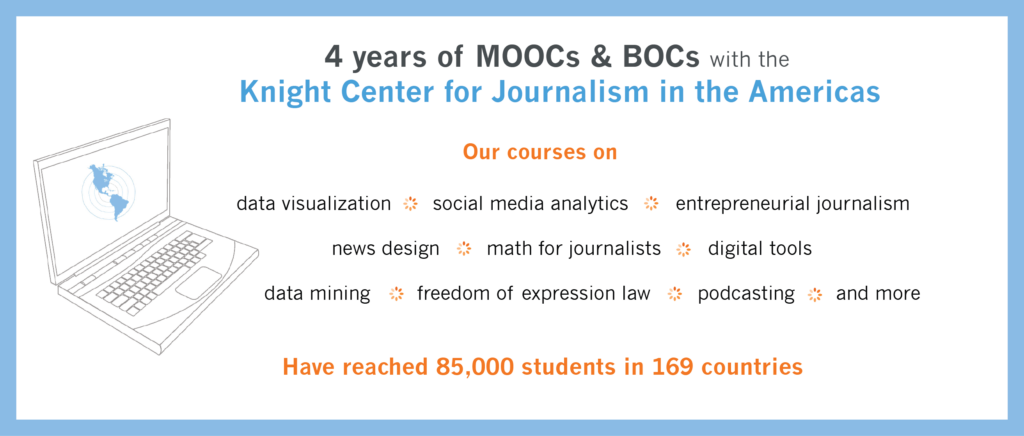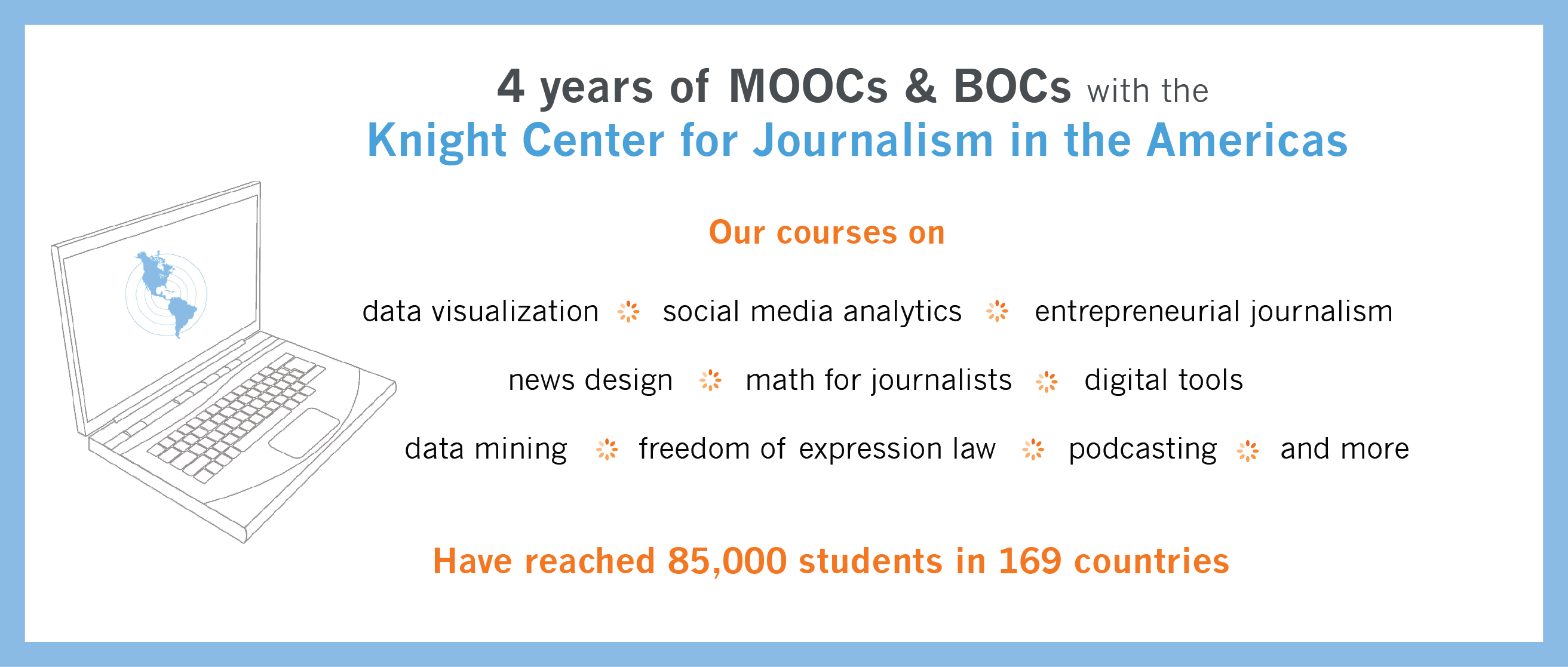
The Knight Center for Journalism in the Americas is celebrating the fourth anniversary of its program of massive open online courses (MOOCs), the first in the world specializing in journalism.
On Oct. 28, 2012, we launched our first MOOC, “Introduction to Infographics and Data Visualization” with the idea of expanding the reach of the Knight Center’s pioneering distance learning program created in 2003.
From 2003 to 2012, the Knight Center at the University of Texas at Austin had offered 120 online courses to journalists in Latin America and the Caribbean, with a total of approximately 7,000 students.
In the last four years, our courses have reached 85,000 people from 169 countries. We offer courses in English, Spanish and Portuguese on a variety of topics, with an emphasis on helping journalists around the world to adapt to digital technologies.
Click here to see a list of all Knight Center courses offered since 2003, including the 25 MOOCs taught in the last four years.
A typical Knight Center MOOC attracts between 3,000 and 6,000 people from around the United States and the world who want to learn journalism skills. The courses are free and usually cover journalism topics at an introductory level.
In addition to the MOOCs, the Knight Center launched BOCs (big online courses) in 2015. These are another modality of online courses that reach a few hundred people, are paid and cover more advanced and specialized topics.
The Center is planning to launch SOCs (small online courses), which are tailor-made to newsrooms and media companies and will reach just a few dozen students.
In April 2016, the John S. and James L. Knight Foundation announced a $600,000 grant to the Knight Center to expand our online journalism education program over the next four years.

This year, we’ve already offered nine courses and have more on the way. We started with “Data Visualization and Infographics with D3,” a BOC in Spanish taught by Alberto Cairo and Carlos Ordóñez.
Veteran instructors Amanda Zamora and Sandra Crucianelli joined us again to offer their courses “Social Media Analytics” and “Digital Tools for Data Journalism,” respectively. The latter course received support from Google.
In Brazil, Google has sponsored a series of MOOCs produced by the Knight Center in association with the Brazilian National Association of Newspapers (ANJ). The last of those courses was taught from June to July 2016 by João Wainer, a Brazilian pioneer of Web TV. Wainer’s Portuguese-language course, “Journalistic Video Production for the Internet,” attracted more than 6,200 students.
The Knight Center collaborated with the Society for News Design to offer “Introduction to News Design” with Sara Quinn and David Kordalski. The course taught students the basics on how to attract and hold the attention of readers using visuals.
We have also collaborated with the Brazilian chapter of the School of Data to offer the BOC “Data Scraping and Mining for Journalists,” which was taught by Marco Túlio Pires in Portuguese. In the course, students learned how to collect data from static PDF reports, website or social networks and transform it into useful databases for journalistic research.
Starting in November, a new course on podcasting will teach students how to start, maintain and market their own podcast. Registration for “Introduction to Podcasting” is open now.
Currently, more than 3,300 students are participating in “Entrepreneurial Journalism: how to monetize, promote and manage digital media,” with instructors Janine Warner, James Breiner and Mij Iastrebrener. This course is a partnership between the Knight Center and SembraMedia, a nonprofit organization dedicated to increasing the diversity of voices and quality of content in Spanish.
Iastrebrener, now an instructor, was a student when this course was first offered in 2015.
“When I first learned about the existence of the MOOC, I felt a huge relief. I was already teaching Entrepreneurial Journalism in Buenos Aires and didn’t know of anyone else teaching the topic. For the first time, I felt that I wasn’t alone,” Iastrebrener said.
Participating in course forums and the fortuitous meeting between Iastrebrener and Warner led the two to create SembraMedia, a new nonprofit organization and online portal made to connect digital journalists in Latin America and Spain.
“I never thought this MOOC was going to change my life the way it did,” Iastrebrener explained.
Many people who take our courses cite their interactions with instructors and fellow students as a big asset.
“Even though there were hundreds, if not thousands, of students around the world taking the course, the conversations we had with each other felt personal,” said Robin Phillips, editor and student of “Introduction to News Design.”
Benefits of taking the courses sometimes extend beyond the virtual classroom and online forums, as was the case for 15 students of “Journalistic video production for the internet” who were selected to participate in a workshop at YouTube Space in São Paulo, Brazil. Thanks to Google support, the authors of the best 15 final video projects produced for the course received a travel grant to go to São Paulo for the workshop at YouTube Space.
Journalist Aline Silva, who works at Diário de Pernambuco and was one of the recipients of the travel grant to YouTube Space, shared their video project on the oldest public market in Brazil.
“Telling a story in an attractive way and escaping the obvious: these were some of the topics covered in the course that most fascinated me and that have sharpened my creativity even more,” Silva said.
The Knight Center has also collaborated with UNESCO, the United Nations and the Organization of American States to produce a series of MOOCs that was not for journalists, as all the other courses, but rather for judges and judicial operators (prosecutors, attorneys, lawyers, etc.). More than 3,500 judges and other functionaries of the judiciary of all Latin American countries (except Cuba) and Spain have participated in the MOOCs on “The International Legal Framework for Freedom of Expression, Access to Public Information and Protection of Journalists.”
The MOOCs were taught by Catalina Botero, former Special Rapporteur for Freedom of Expression at the Inter-American Comission on Human Rights, Frank LaRue, former UN Special Rapporteur on the Promotion and Protection of the Right to Freedom of Opinion and Expression and Edison Lanza, current Special Rapporteur for Freedom of Expression at the IACHR.
The Knight Center for Journalism in the Americas was created in 2002 by Professor Rosental Alves, Knight Chair in Journalism and UNESCO Chair in Communication at the School of Journalism at the University of Texas at Austin. The Knight Center’s distance learning program continues with support from the John S. and James L. Knight Foundation, the Moody College of Communication at the University of Texas and other donors; as well as income from registration fees and the issuance of certificates.